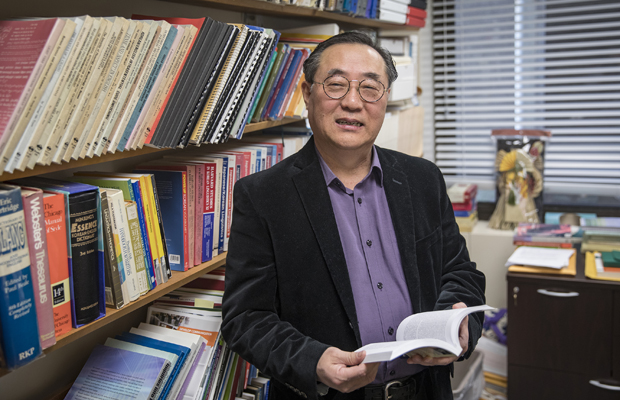Cho to lead international linguistics project
Researchers to collaborate on study of Korean language in Northeast Asia

A Binghamton University faculty member will help lead an international collaborative project on Korean linguistics over the next four years.
Sungdai Cho, director of the Center for Korean Studies, developed the project with John Whitman, a linguistics professor at Cornell University. “Korean at the Nexus of the Northeast Asian Linguistic Area” received a five-year, $1.4 million grant last fall from the Academy of Korean Studies. The project, led by Cornell University, will examine the status of the Korean language in the region. Cornell and Binghamton will split the grant funding over the five years.
“In Asian countries, there are so many different languages, including Chinese, Japanese and Korean,” Cho said. “Nobody has said that Korea is the center of those linguistic areas. This proposal is distinctive from other people’s opinions.”
The project is the first to bring researchers of East Asian languages together and to direct a focus toward the Korean language.
According to the proposal, the project objective is to “provide a solid linguistic basis for our understanding of Korean as a major world language.” Korean shares features with languages to its north, south and east, mirroring the central cultural and political placement of Korea.
The project was one of five proposals to receive a laboratory grant from the Academy of Korean Studies. The other host schools are Georgetown University’s Center for Strategic and International Studies, with an emphasis on political science; the University of Pennsylvania, with an emphasis on sociology; Cambridge University, with a focus on political science; and the University of London, with a focus on Korean language.
Besides Cho and Whitman, the 10-member project team features two researchers from the United States (Queens College-CUNY and the University of Washington in Seattle) and two from Japan (International Christian University). Other countries represented include Korea (Seoul National University), Germany (Johannes Gutenberg University in Mainz), Finland (University of Helsinki) and Canada (Simon Fraser University). The team will eventually grow to include graduate assistants and postdoctoral researchers.
“I’ve known most of the team members for 20 to 30 years,” Cho said. “They are leaders in the linguistics area and are faculty members in linguistics programs.”
The team members, who specialize in diachronic linguistics (the history of languages) and synchronic linguistics (contemporary language construction), will produce five books, 15 journal articles and two edited volumes at the end of the five-year grant in 2021. Cho himself will author two books (“Introduction to Korean Linguistics” and “A Comparative Linguistics of Korean and Japanese”), two journal articles and one edited volume by Cambridge University Press.
The project will also include two international conferences: one in Seoul in 2018 and another in St. Petersburg, Russia, in 2020. The Seoul conference will focus on contemporary Korean linguistics, while the St. Petersburg conference will examine the history of Korean linguistics. The latter was picked for the 2020 conference, Cho said, because St. Petersburg University was the first institution outside of the Korean peninsula to offer a Korean language program.
The remaining years of the grant will see smaller workshops held in New York state. A workshop at Cornell took place last fall. Binghamton University and Queens College will host workshops in 2017 and 2019, respectively.
In 2011, Binghamton University received a $1 million Overseas Leading University Program for Korean Studies Grant from the Academy of Korean Studies. The grant supported research, education and international exchanges with Binghamton University as a center for Korean language education.
The current linguistics project will have two major benefits for Binghamton University, Cho said.
“There are (only) 20 to 30 universities offering Korean linguistics,” he said. “This project will give Binghamton University momentum to become an (international) center for Korean linguistics. We will also bring in teaching assistants. That will bring more people to Binghamton for research in Korean linguistics.”
The idea of Korean at the nexus of the Northeast Asian linguistic area is “revolutionary,” Cho said, and could eventually change preconceptions that have been in place about the region since the 19th century.
“Our basic assumption about Korean linguistics will be different to many, especially researchers of Japanese, Chinese and Korean,” Cho said. “Producing five books and 15 journal articles could change (minds). I don’t know how big the impact will be, but this is a new idea that isn’t being mentioned by many people.”
